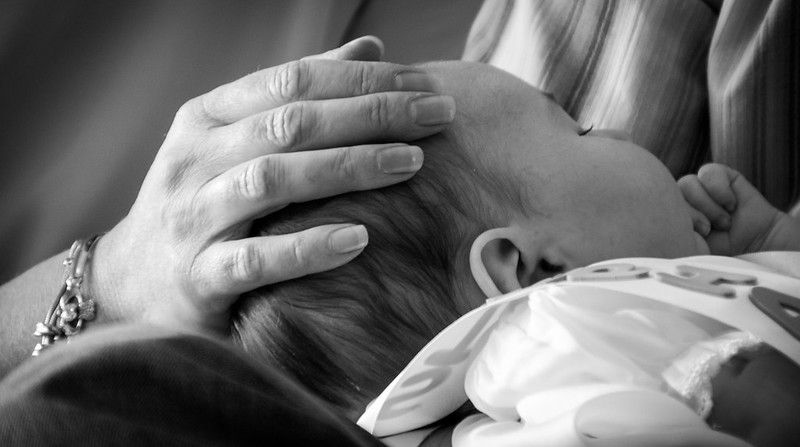Three of our DC/Maryland clusters did a tour inside of the Washington Monument for their May cluster meeting. This was our first Washington Monument tour since before the pandemic! We were very happy to have a great turnout and gorgeous weather.
Yearly Archives: 2022
Au Pair Hint For Success – Finish your Year Strong
 In the final months of your au pair year, it can be tempting to become relaxed in the way you complete your duties. You may be thinking about your travel month, returning home and the next chapter of your life. That can be exciting and sometimes a little overwhelming. Don’t be afraid to talk with your host family, community counselor and friends if you need support.
In the final months of your au pair year, it can be tempting to become relaxed in the way you complete your duties. You may be thinking about your travel month, returning home and the next chapter of your life. That can be exciting and sometimes a little overwhelming. Don’t be afraid to talk with your host family, community counselor and friends if you need support.
You have done a wonderful job and made it so far! Don’t forget you are still an important part of your host family and they are still counting on you in these final months of your program.
Holiday & Vacation Reminders
“Rest and be thankful.” – William Wordsworth
Holidays and vacations are a great opportunity to rest, recharge and explore the U.S.
Memorial Day Weekend is the unofficial start of the summer travel season. Here are some reminders about program rules regarding holidays, vacations, and international travel.
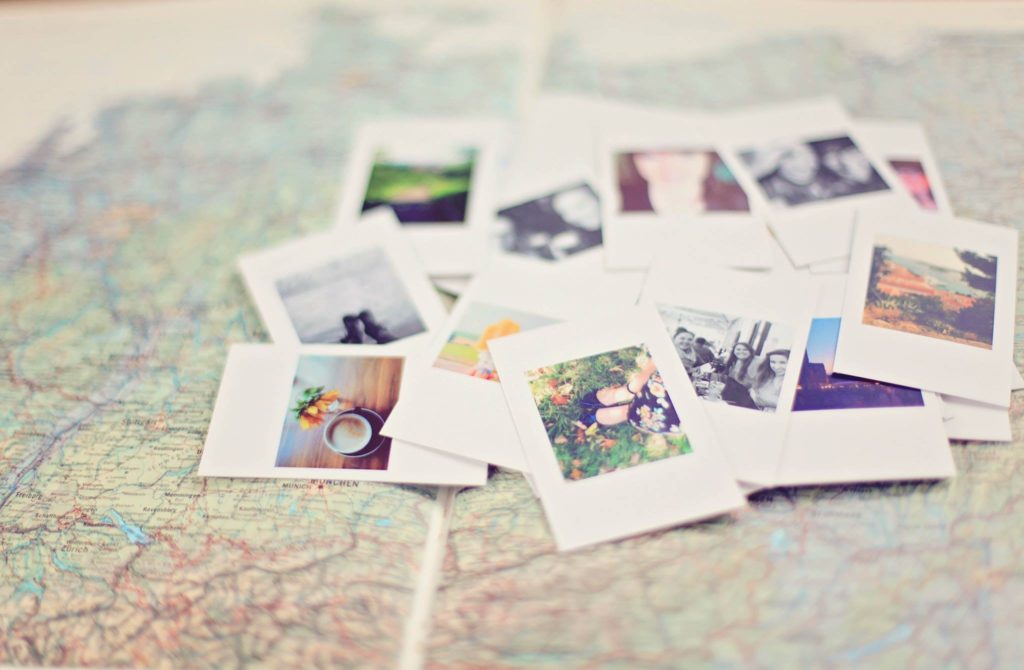
Holidays
- Host families are not required to give au pairs off on any specific holidays.
- Each host family will make different arrangements for holidays, some au pairs will be off and others will be required to work.
- Au pairs should not make plans for holidays without checking with their host family first.
Vacations
- During the pandemic, it is important that au pairs and host families discuss what travel and activities are an acceptable level of risk before plans are made.
- Au pairs earn 2 weeks of paid vacation during the course of their year.
- Vacation time should be mutually agreed upon.
- All vacations should be preplanned (at least 4 weeks in advance).
- All au pair’s friends and/or family visits/vacations should be pre-approved prior to purchasing tickets.
- If an au pair travels with her host family, it should be discussed in advance whether this is the au pair’s vacation or if she is working.
- If an au pair travels with the host family to work, the host family is required to pay for her transportation, lodging, and meals. Regulations still apply while on vacation (i.e. not working more than 10 hours/day and 45 hours/week, minimum 1 1/2 days off, and private bedroom).
Travel Outside of the U.S.
Photo: Leah Kelly from Pexels
Travel Outside of the U.S.

10 Things to Know Before You Go
- There is always some risk with traveling outside of the U.S., as re-entry is at the discretion of the port of entry agent. APIA recommends that au pairs and host families discuss the risks and decide whether they are comfortable.
- Please review the appropriate checklist(s) from APIA, as you make your travel plans.
- All Au Pairs must mail their original DS-2019 along with a Travel Validation Request Form to APIA, at least 3-4 weeks prior to international travel. Check out this blog post for step-by-step instructions on how to send this in the mail. Note: The travel validation ensures that you are in good standing with the program, it is not formal permission to travel.
- Year 1 Au Pairs must have a valid visa to travel internationally and plan to return to the U.S. prior to the date their visa says it expires. This can be different from the actual program end date.
- Year 2 Au Pairs may visit Canada, Mexico, and the adjacent islands due to the Automatic Revalidation Policy. No other international travel is allowed in Year 2.
- Year 3 Au Pairs (special extension) are not permitted to travel internationally.
- All Au Pairs must independently research whether they will need an additional visitor’s visa for their destination. This will depend on their nationality and travel destination.
- Only fully vaccinated travelers will be admitted into the U.S. This means that all foreign visitors must be vaccinated against COVID-19 and must show proof of vaccination before boarding a U.S.-bound airline.
- All Au Pairs will need to get a COVID-19 viral test (regardless of vaccination status or citizenship) no more than 1 day before they travel by air into the United States. They must show the negative result to the airline before boarding the flight. This test is not for a medical reason, so it will not be covered by insurance and you will need to cover the cost yourself.
- When you return to the U.S. you should follow CDC and local guidelines regarding quarantine and testing.
Photo: Porapak Apichodilok from Pexels
Mother’s Day is Sunday, May 8th
Mother’s Day recognizes mothers, motherhood, and maternal bonds in general, as well as the positive contributions that they make to society. It is celebrated in the United States on the second Sunday in May. It was established by Anna Jarvis, with the first official Mother’s Day was celebrated at St. Andrew’s Methodist Church in Grafton, West Virginia, on May 10, 1908.
You will find lots of fun ideas for projects you can make with your host children on the Au Pair in America Mother’s Day pinboard.
Photo: Mike van Dalen (Flickr)
How to Handle Transportation Costs
Program rules dictate several situations when the host parents are required to cover an au pair’s transportation costs. Aside from those specific requirements there are some things to consider when deciding how to handle an au pair’s personal transportation.
Situations when host parents are responsible for the au pair’s transportation costs:
- To/from cluster meetings
- To/from classes (for the education requirement)
- When they are transporting the host children
What are some ways host parents can pay for those required transportation costs?
- By providing car use and paying for the cost of gas in those situations
- By giving an allowance for Metro or bus fare
- By giving an allowance toward Uber/Lyft
- By paying for bike share
Who is responsible for an au pair’s transportation in her free time?
- If an au pair has car use, it would be reasonable for the host parents to ask her to pay for the gas used for personal car use.
- If the primary use of the car are things host parents will cover (host parent use, transporting the children, au pair classes and cluster meetings) then normally host parents will put in the gas or give au pair money to fill up the car and then ask her to replace the gas she’s using for personal time.
- If the car is exclusively used by the au pair, she can be responsible for filling up the car. Then host parents should calculate how much the au pair will use for the things they are responsible for (transporting the children, au pair classes and cluster meetings) and give her money to cover that each week.
- If no car use is provided and an au pair must rely solely on public transportation, many host parents will give a transportation allowance to help with those costs.
- If your au pair is relying on public transportation, would you feel comfortable having her walk home from metro or bus stop at midnight? If not, how can you help with that?
What factors should you consider when deciding how to handle personal transportation costs?
- Where do you live?
- Are you within easy walking and/or bike-riding distance to shopping and activities?
- Is car use provided?
- When host parents provide car use, that includes them covering the cost of car insurance and maintenance. So, it is fair to ask the au pair to pay for her own gas for personal use.
- If host parents are not providing car use, many will figure out how much they are saving by not paying for insurance and maintenance costs and offer that to their au pair as an allowance for public transportation (metro, bus, Uber/Lyft).
Other Things to Consider
- Au pairs are happiest when they are able to explore the area and make friends. This goes a long way to reduce homesickness and ensure a great cultural exchange experience. The more host parents can do to support this, the more successful their match will typically be.
- When car use is provided, be clear about any limitations. Is it okay to transport friends, take the car overnight, go on a road trip, drive to Baltimore or Ocean City? In what situations does she have automatic permission and when does she need to ask in advance?
- Every match is different. Transportation is only one aspect. Whatever works well for a host family and their au pair is what’s best (as long as the minimum program requirements are being met). Things like whether a host family is paying a higher stipend (over the regulation minimum), offering other benefits and driving the au pair to some places all may factor into how personal transportation costs are handled.
- Please discuss transportation plans for cluster meetings in advance. While participation in cluster meetings is not mandatory, it is strongly encouraged. Cluster meetings are important for an au pair’s overall cultural experience, making friends and getting to know her counselor. Lack of transportation to meetings should not be an impediment to those experiences.
If you have questions or concerns about how to handle transportation, reach out to your counselor to discuss.
Photo: Andrea Piacquadio
What is Passover?
What is Passover?
 Passover is the Jewish celebration lasting seven to eight days (seven in Israel, eight outside of it) that marks the freedom of the Jews from enslavement by the Egyptians. According to the Old Testament, the Jews, led by Moses, had requested freedom from the Pharaoh of Egypt but were denied. To punish the Egyptians, God sent the 10 plagues to Egypt to convince the Pharaoh to release the Jews. The last of these plagues, and the most devastating, was to kill the firstborn male in each Egyptian household.
Passover is the Jewish celebration lasting seven to eight days (seven in Israel, eight outside of it) that marks the freedom of the Jews from enslavement by the Egyptians. According to the Old Testament, the Jews, led by Moses, had requested freedom from the Pharaoh of Egypt but were denied. To punish the Egyptians, God sent the 10 plagues to Egypt to convince the Pharaoh to release the Jews. The last of these plagues, and the most devastating, was to kill the firstborn male in each Egyptian household.
When is Passover?
Passover in 2022 will start at sunset on Friday, the 15th of April and will continue for 7 days until Saturday, the 23rd of April.
How is Passover celebrated?
Family and friends gather together after nightfall on the first and second nights of the holiday for the high point of the festival observance, the Seder. During the Seder, which means “order” in Hebrew, the experience of the Exodus is told in story, song, prayer, and the tasting of symbolic foods. The Seder meals include four cups of wine, eating matzah and bitter herbs, and retelling the story of the Exodus.
Here are some websites, with Passover activity ideas for kids.
Create a Spring Break Game Plan
 “Game plan” means a strategy for how you are going to accomplish something. In the case of keeping kids from getting bored and/or into trouble, the best way to prevent it is to keep them busy with safe, fun activities.
“Game plan” means a strategy for how you are going to accomplish something. In the case of keeping kids from getting bored and/or into trouble, the best way to prevent it is to keep them busy with safe, fun activities.
When there are days home from school, letting kids sit around watching TV or playing video games is not the best use of their time. Providing fun alternatives will make it much easier to pull them away from the screen.
You need to make a plan of what you will do with them each day and prepare for that. Planning is very important. You don’t want to tell them you are going someplace fun, only to arrive there and see they are not open that day or you needed to bring something and you don’t have it.
If your plan includes a craft or cooking project, make sure you have:
-
- All the ingredients/supplies
- Recipe/directions
If your plan includes an outing to someplace fun, figure out:
-
- How will you get there?
- When you should leave?
- How much it will cost?
- What will you do for lunch?
Use some of these online resources to find activities and recipes:
-
- Au Pair in America Pinterest Pinboards
Have a Wonderful Spring Break!
Image: Canva.com
Big Kids Need Interaction, Too
Just because a child is old enough to occupy themselves, doesn’t mean that they should be expected to do so the majority of the time. Host families have a certain expectation of activity and involvement for their children. Get the kids engaged and active. You can be more fun than the TV or a video game.
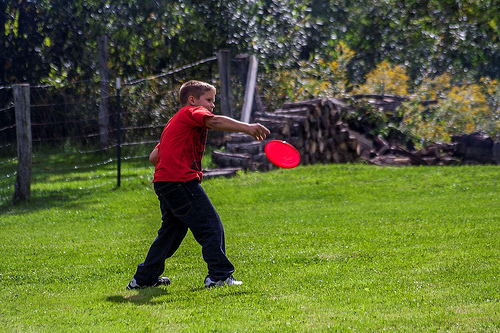
Problem:
But, my kids don’t want to do anything but watch TV or play video games.
Solution:
Instead of saying, “Would you like to (fill in the blank with any activity)? The answer will often be, “No.”
Try this, “Now we are going to (fill in the blank with any activity.) or “Would you rather do _____ or ______?” Make sure both the choices are good options.
Your chances of co-operation are greatly increased. Even kids who are reluctant to try new things will usually get in the spirit of things and have fun if you pick a good activity.
Problem:
I don’t know what to do with school-age kids.
Solution:
Look for ideas online. Google “activities school-age kids” or “activities tweens”. You can also take part in an au pair webinar on this topic. Below is a list of some ideas to get you started.
- Cooking
- Making things (check craft stores like Michael’s for kits and models that are age-appropriate)
- Going to fun places (pottery painting, jewelry making, farms, museums, mini-golf, go-karts)*
- Sports (soccer, tennis, swimming, bicycling, roller skating, ice skating)*
- Let them teach you to do something they enjoy. Kids this age love being the expert.
- Get outdoors and visit local parks.* You can even make a project of reviewing all the local parks (what kind of equipment they have, is there shade, water fountain?) They can write this up and keep, so they remember which ones they want to go to again and which ones to skip in the future.
- Let them help you search and plan some activities.
- Check on the APIA Pinterest page and here on our cluster blog for ideas.
- If you have a GPS, try taking them geocaching. Here is a website with all the details.
- Use technology to get them off the couch and sneak in some exercise. The phone app Pokémon Go includes activities that are unlocked by taking steps. There are Pokéstops and gyms at many places they might enjoy going for walks like parks, nature trails, walk/bike paths, and downtown areas.
*Always get permission from your host parents before taking the kids places and remember to follow social distancing and mask-wearing protocols.
Three Ways for Au Pairs to Stay Red Cross Ready
Being knowledgeable in basic first aid and CPR is important for au pairs (and anyone else caring for children). Au Pair in America’s commitment to infant/child safety begins before au pairs arrive in the U.S., with pre-arrival training and continue throughout the au pair year.
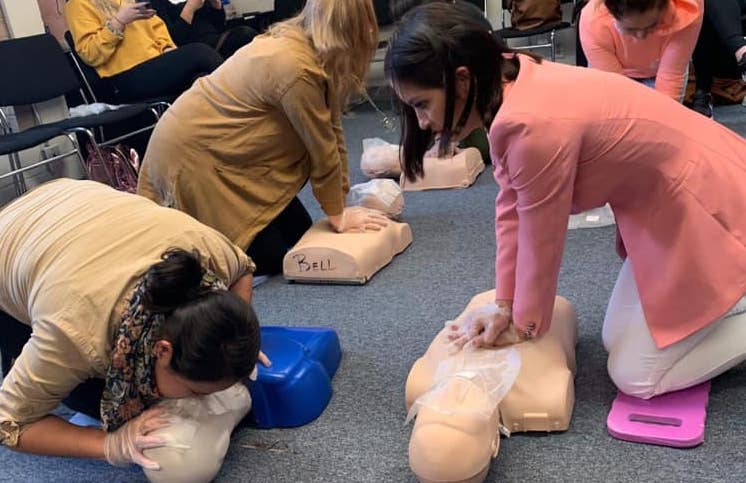
#1 Training At Orientation
Our orientation training includes a course by American Red Cross on infant/child CPR and safety. Additional child safety training covers a variety of aspects of child safety and cultural differences in common childcare practices.
#2 Enroll in a Red Cross Certification Class
After settling into their host community, all au pairs are encouraged to complete an Infant/Child CPR and First Aid certification program. Au Pair in America will pay for this training through the American Red Cross.
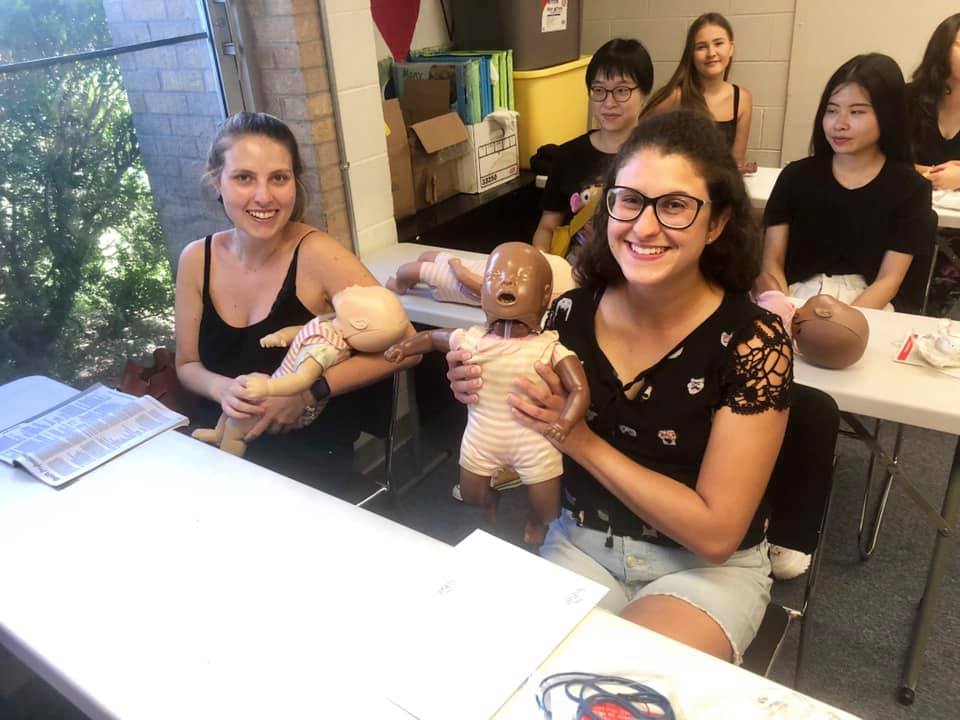 Classes are available through the Red Cross. Au Pair in America will pay for the cost of a class providing an au pair has at least six months left on her visa and is taking one of several approved childcare/child safety-related classes, such as Adult and Pediatric First Aid/CPR/AED. Au pairs should check with their community counselor and host family before signing up. Au Pair in America will register the au pair directly.
Classes are available through the Red Cross. Au Pair in America will pay for the cost of a class providing an au pair has at least six months left on her visa and is taking one of several approved childcare/child safety-related classes, such as Adult and Pediatric First Aid/CPR/AED. Au pairs should check with their community counselor and host family before signing up. Au Pair in America will register the au pair directly.
To locate a class, visit www.redcross.org/takeaclass.
#3 Stay Current on Safety Information
The official American Red Cross First Aid app puts expert advice for everyday emergencies in your hand. Available for iPhone and Android devices, this app gives you instant access to the information you need to know to handle the most common first aid emergencies. With videos, interactive quizzes, and simple step-by-step advice, it’s never been easier to know first aid. Download the app for free from the American Red Cross website or in your app store.
Photos: Robin Leon


